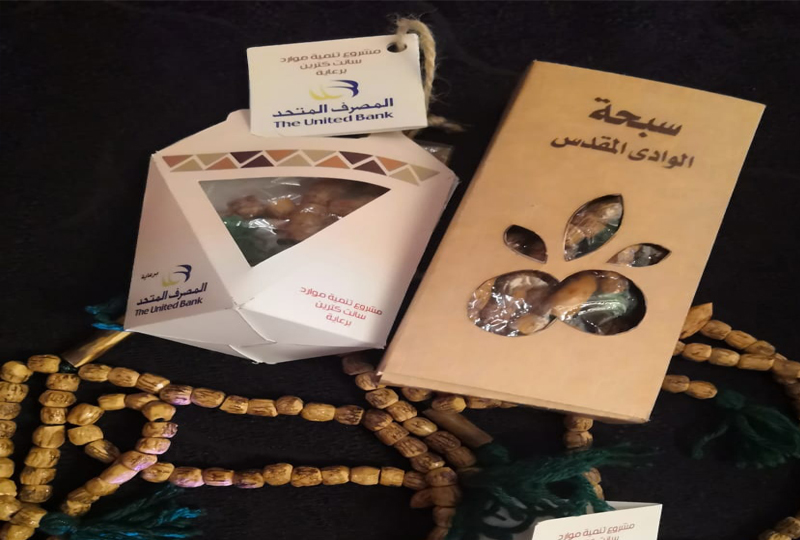The United Bank launches "Tagaleyat" project
14/06/2021

The United Bank
launches "Tagaleyat" project to recycle olive solid waste to produce rosaries and revive craft industries
Gihan Abou Hussein – Head of "Ethar" Community Development at The United Bank
• Olive cultivation and industry is a wealth and its waste is a golden opportunity for investment.
• Egypt is the world leader in olive production.
• The President’s initiative to plant 100 million olive trees by 2022.
• 7 industries based on the remnants of olive cultivation and industry.
• The rosaries’ manufacture, revival of handicrafts.
Cairo: June 14th, 2021
The United Bank launched today "Tagaleyat" project to recycle olive solid waste to produce rosaries and revive craft industries. This is within the framework of The United Bank’s recent initiative to empower 350 families from the people of Saint Catherine and “Tagaly” Transfiguration Mountain, as a first stage, in cooperation with Major General Khaled Fouda - Governor of South Sinai.
On the sidelines of the third forum for the strategies of transformation towards a green economy under the slogan "Sustainable Finance and Green Investment" under the patronage of Prime Minister Dr. Moustafa Madbouly, The United Bank presented its experience in the presence of Dr. Yasmine Fouad - Minister of Environment, Egypt's Sovereign Fund, a large number of civil society institutions and a group of people from the media.
Olive cultivation and industry is a wealth and its waste is a golden opportunity for investment
About the launch of the first set of rosaries that were recycled from the olive solid pressing waste, Gihan Abou Hussein - Head of "Ethar" community development, The United Bank for Sustainable Community Development - says that olive cultivation and industry is a great national wealth and its waste is a golden opportunity for investment.
Egypt is the world leader in olive production
Egypt ranked the first position in olive production, with a crop of 510 thousand tons in 2020, compared to 450 thousand tons in 2018, with an increase of 13.3%, according to a report by the Aswaq Company for Financial and Commodity Information.
The President’s initiative to plant 100 million olive trees by 2022.
Abou Hussein attributed the increase in the volume of production to the President’s initiative which was launched last 2015 to encourage the planting of 100 million olive trees until 2022.
7 industries based on the remnants of olive cultivation and industry
Gihan Abou Hussein expressed that olive waste is rich and can be transformed into a basic product with added value if it is processed. There are 7 industries that depend on the remnants of olive pressing, such as extracting bio-fertilizers, making bio-pesticides and animal feed concentrates as well as the manufacture of vegetable silk and natural paper. The remnants of the olive pressing process can also be used in the coal industry and soap manufacturing.
The United Bank "Tagaleyat " project
It is worth noting that "Tagaleyat " project, launched by The United Bank earlier this month in cooperation with The Governorate of South Sinai, aims at economic empowerment for the people of St. Catherine and “Tagaly” Transfiguration Mountain region. It aims to promote entrepreneurship to improve competitiveness and productivity, especially in the field of manufacturing agricultural and food products and handicrafts for which this region is famous, such as: the mountain honey extraction industry, the olive oil extraction and pressing industry, the natural herbs cultivation, the almonds cultivation and the soap industry as well as handicrafts with the famous Sinai embroidery and the manufacture of rosaries from the remnants of olive trees in the Holy Valley and El Arba’een Valley.
The rosaries’ manufacture in Egypt
The rosary is a necklace consisting of a group of pierced beads gathered by a thread that passes through the holes in the beads to form a ring.
The rosaries’ manufacture in Egypt is a traditional craft. It is done manually. One of the most famous rosaries in Islam is the rosary of El Sayed El Badawy. It is about 10 meters long. It is made of agar and sandal woods, which smells beautiful. Rosaries have several benefits, including: religious rituals, enhancing energy pathways, and relieving anxiety.


